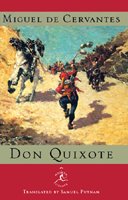The best novel in the universe. So many richly fascinating episodes, such finely balanced tragicomedy, it is alternately hilarious and painful. The sublime visionary Quixote and the slyly Rabelaisian Sancho together form the ultimate human personality. Striking through the masks of materialism to create new spiritual values, Don Quixote proclaims "I know who I am, and who I may be if I choose."
This book has been dear to my heart and I have read it multiple times over the last decade. On my first reading, at the idealistic age of seventeen, I was enamored with Quixote's heroics, absurd though they are, and wished to be his apostle. A second reading revealed to me the richness of the character of Sancho Panza, as well as some of the darker shadings of Quixote's madness and violence. Having read it several times since, I see Quixote and Sancho as related aspects of a universal human character, as a lovely and pugnacious friendship, and as showing the best and worst in each of us, all served with generous doses of humor.
Part One is a sublime parody, and Part Two is a sublimer parody of a parody, as Quixote encounters characters who have read Part One and thus formed various opinions of him. In the decade between the writing of Parts One and Two, an anonymous author published his own spurious part two, and the inconsistencies and frustrations brought about are deliciously absurd. Cervantes was writing an extended prose narrative in a time before novels, and so he is improvising the form as he goes. At times, it all seems postmodern centuries before modernism, as stories within stories, narrators within narrators, and spurious unauthorized characters roam the Spanish countryside.
Don Quixote is episodic in nature, rather than following a classical plotline. It is crammed full of mysterious images, ridiculous situations, and slapstick humor. It is rich and lively and generously rewards repeated readings.
Friday, February 11, 2011
Subscribe to:
Post Comments (Atom)












No comments:
Post a Comment